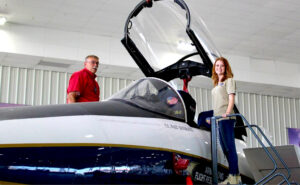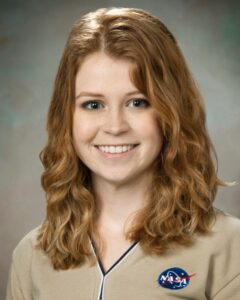 Q and A with UGA Engineering student and NASA intern Kaitlyn Summey
Q and A with UGA Engineering student and NASA intern Kaitlyn Summey
Kaitlyn Summey may have one of the coolest internship gigs ever. A third-year computer systems engineering major in the University of Georgia College of Engineering, Summey is working this semester at NASA’s Armstrong Flight Research Center. Located at Edwards Air Force Base in California, NASA Armstrong is the space agency’s primary center for atmospheric flight research and operations.

Kaitlyn Summey
Tell us about your internship with NASA. What type of work are you doing?
I am working at Armstrong’s fiber optic sensing systems (FOSS) lab. Our sensing system collects real-time data of a variety of engineering parameters, such as strain, shape deformation, liquid level, operational loads and temperature. Broadly, I’m working on FOSS development. I’m assigned to implement new lasing technology and design circuit boards to integrate into our current system. Here is a link to more information about FOSS: http://www.nasa.gov/offices/ipp/centers/dfrc/technology/Fiber-Optic-Sensing-Suite.html#.V-QLcigrKUk
What skills have you learned at UGA that you apply to your work with NASA?
I’ve been doing research in Dr. Peter Kner’s optical engineering lab, and since I’m working in a FOSS lab, I use what I learned working in the lab on a daily basis. I gained a lot of experience that I normally wouldn’t have learned this early in my degree. I’m also very grateful for the extensive introduction to computer systems engineering from Dr. Kyle Johnsen. I think I would be lost without all I learned from that class. Honestly, I wouldn’t be here without the influence and support of all the great professors I’ve had at the UGA College of Engineering.
What are some of the biggest challenges you’ve faced during your internship?
I haven’t had to overcome any difficult challenges yet but looking forward my biggest challenge is leaving a good impression for my school and my future career. I’ve worked really hard to get here, and I will do whatever it takes to stay with NASA.
Any success stories or “breakthrough moments?”
Every time my mentor teaches me something new is a breakthrough moment for me, and that happens multiple times a day. I’m learning a lot here, and I couldn’t have asked for a better mentor than Allen Parker.
Is aerospace a field you could see yourself working in after college?
I would love to work for NASA after I finish school. Not only is it a wonderful work environment, but I really feel like the work here is making a difference. I would say my interests are with NASA as a whole, not just the aerospace industry. I’ve always been interested in NASA because of the tremendous impact that agency has had on technological development. The work we do here is applicable to so many different fields. Most people don’t realize how much NASA has contributed to the daily lives of all Americans.
What attracted you to the internship with NASA?
Working for NASA has always been a dream for me. After seeing multiple rockets launch at Kennedy, it’s hard to not want to work here.
The Armstrong Flight Research Center has a storied history. What’s it like to work in a place where so many advances in aerospace have occurred?
It’s really inspiring. There’s so much history here, it’s like I’m learning something new about it every day. Sometimes it reminds me of the pride you feel on Saturdays in Athens. Everyone here is a big family, and we all love what we do.


